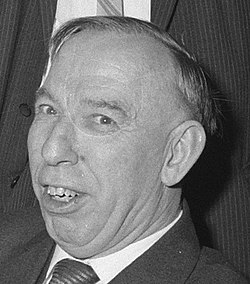The examples and perspective in this article may not represent a worldwide view of the subject.(December 2024) |
This list of lesbian, gay, bisexual, transgender and queer (LGBTQ) firsts by year denotes pioneering LGBTQ endeavors organized chronologically. Openly LGBTQ people remain a demographic minority in most places. In areas that historically are not known for having (or being friendly to) LGBTQ people who do not remain closeted, a "first" can make it easier for other openly LGBTQ persons to enter the field or for those who are closeted to come out. Openly LGBTQ people being visible in society affects societal attitudes toward homosexuality, bisexuality, and the transgender community on a wider level.
Contents
- 1600s
- 1672
- 1800s to 1930s
- 1896
- 1897
- 1904
- 1912
- 1918
- 1919
- 1923
- 1924
- 1927
- 1930s
- 1931
- 1936
- 1937
- 1939
- 1940s
- 1944
- 1945
- 1947
- 1950s
- 1950
- 1952
- 1955
- 1956
- 1958
- 1959
- 1960s
- 1960
- 1961
- 1962
- 1964
- 1965
- 1966
- 1967
- 1968
- 1969
- 1960s (year unknown)
- 1970s
- 1970
- 1971
- 1972
- 1973
- 1974
- 1975
- 1976
- 1977
- 1978
- 1979
- 1970s (year unknown)
- 1980s
- 1980
- 1981
- 1982
- 1983
- 1984
- 1985
- 1986
- 1987
- 1988
- 1989
- 1990s
- 1990
- 1991
- 1992
- 1993
- 1994
- 1995
- 1996
- 1997
- 1998
- 1999
- 2000s
- 2000
- 2001
- 2002
- 2003
- 2004
- 2005
- 2006
- 2007
- 2008
- 2009
- 2010s
- 2020s
- 2020
- 2021
- 2022
- 2023
- 2024
- 2025
- See also
- References
- Bibliography
- External links
One commonly cited example is Michael McConnell and Jack Baker, the first openly gay couple to apply for a marriage license in 1971. Another is Harvey Milk, the first openly gay person to be elected to political office in California, becoming the most visible LGBTQ politician in the world in the 1970s, after decades of resistance to LGBTQ people by mainstream culture. Milk encouraged LGBTQ people to "come out of the closet" during his speeches; as a result of his work and his assassination—along with San Francisco mayor George Moscone—thousands of ordinary people did so. In 2002, Milk was called "the most famous and most significantly open LGBT official ever elected in the United States". [1]







